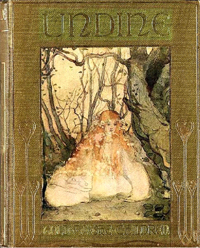by Allan Greene
PART THE FIRST
This is going to be a personal reading of the White Swan score. How could it be otherwise? I am going to lead the reader through a walking tour of my thoughts as I try to explain the method in the un-methodical: the search for a way to convey through musical sounds the score’s layered and sometimes contradictory messages.
Here’s what we’re dealing with: the historical context of the music, the dramatic role of the music in the context of the larger story, the meaning of the orchestration, the various “personalities” embodied in the score, and of course this correspondent as the particular messenger of this reading.

Undina came first
It makes sense, when you think about it, that Pyotr Ilyich Tchaikovsky was smitten with opera. Which of Tchaikovsky’s works do you know? The ballets, the first piano concerto, the 1812 Overture, Romeo & Juliet (at least the soaring love theme), probably the Serenade for Strings, possibly one or more of the last three symphonies. What unites all these works? Their vivid melodrama.
What you may not know, and most listeners don’t, is that Tchaikovsky wrote eleven operas, from Voyevoda at the beginning of his career (1869) to Iolanta the year (1892) before his death. He loved stories and was apparently a great storyteller. From his early youth he was always very literary, a voracious reader. He became a hyper-prolific writer of concert reviews and letters.
He developed into an exceptionally emotional adult. Even leaving his emotional life out of it, his mature aesthetic orientation was nervous and super-charged.
After his modest success with his first opera, Voyevoda, he turned to a more mythical but tragic romance based on a popular 1811 literary fairy tale, Undine, written by the German novelist Friedrich de la Motte Fouqué. Tchaikovsky’s Undina (1869) never made it onto the stage. Indeed, Tchaikovsky was given to bouts of self-doubt and depression, and, after Undina had been rejected by the Imperial Theater, he took it out on the manuscript, destroying the most of it.
But we are in the fortunate position in 2012 to be able to listen to what escaped the flames. For example, consider this love duet from the final act: [Read more…]





